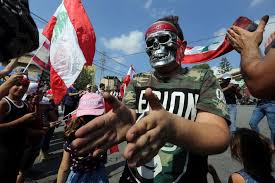Facing protests, Lebanon approves emergency economic reforms

Lebanon approved an emergency package of economic reforms on Monday in response to countrywide protests against economic mismanagement, but demonstrators stayed in the streets and foreign investors said the moves did not go far enough.
Hundreds of thousands of people have flooded the streets since Thursday, furious at a political class they accuse of pushing the economy to the point of collapse. People blocked roads for a fifth day across the country.
Schools, banks and businesses were closed. Banks would remain shut on Tuesday.
Hariri, addressing the protesters in a televised speech, said the measures agreed on Monday might not meet their demands but were a start towards achieving some of them. The government must work to recover the people’s trust, he said.
“You are the compass and … your movement frankly is what led us to this decision today,” added Hariri, who said big steps had been taken towards fighting corruption and waste.
But despite the reforms package, Lebanon’s dollar-denominated sovereign bounds suffered hefty losses on Monday following sharp drops on Friday. Some sank to record lows.
Investors said the political turmoil showed that the country was running out of time to sort out its economic problems.
“It is just a mess – and it looks like it is more and more unsustainable. I don’t think it is a final nail in the coffin – but it is looking ominous,” said Kevin Daly, Senior Investment Manager, Emerging Market Debt at Aberdeen Standard Investments.
“There has been fiscal adjustment, but it has not been enough.”
NOT CONVINCED
The reforms included the symbolic halving of the salaries of government ministers and lawmakers, as well as moves towards implementing long-delayed measures seen as vital to putting Lebanon’s public finances on a sustainable path.
Maya Mhana, a teacher listening to the speech in central Beirut with other protesters, was not convinced. “We are remaining in the streets, we don’t believe a single word he said,” she said.
Protesters sang the national anthem into the night in Beirut and continued to demonstrate in other parts of the country, including the northern city of Tripoli and Sidon in the south.
“We don’t believe that they can change in two days,” said Fadi Abou Dargham, a 55-year-old jeweller.
The protests have been extraordinary because of their size and geographic reach in a country where political movements are normally divided on sectarian lines and struggle to draw nationwide appeal.
Lebanon has one of the world’s highest levels of government debt as a share of economic output. The government includes most major parties, run by politicians widely perceived to have mobilised state resources and influence for their own gain.
The economy has been hit by political paralysis and regional conflicts, compounded by strains in the financial system that have risen as capital flows into the country have slowed down. Unemployment among the under 35s runs at 37%.
International donors last year pledged $ 11 billion to help Lebanon finance a major programme of capital investment aimed at reviving the economy, conditional on reforms. Hariri said the decisions taken on Monday would satisfy donors and the government would approve within three weeks the first phase of the capital investment programme.
HARIRI SEES HISTORIC ACHIEVEMENT
The government approved a 2020 budget with no new taxes and a deficit of around 0.6% of national output, Hariri said, describing this as a historic achievement. The deficit for 2019 is around 7% of GDP.
Lebanon’s large banking sector would contribute 5.1 trillion Lebanese pounds (£2.6 billion) to deficit reduction, including through an increase in the tax on bank profits, Hariri said.
Cost-cutting steps included abolishing the ministry of information and other public institutions immediately and merging other unnecessary ones.
The government would also accelerate the long-delayed reform of the state-run power sector, which drains $ 2 billion from the treasury per year while failing to deliver enough power for Lebanese who depend on private generators to fill the gap.
The pressures in Lebanon’s financial system have shown up in the real economy, where it has become harder to obtain dollars at the official exchange rate. The pound, pegged at its current rate for two decades, has been under pressure.






